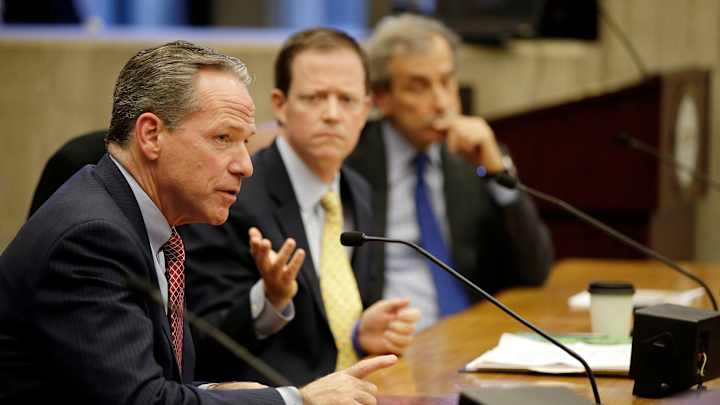Will USOC stick with Boston, give up, or pick another city?

COLORADO SPRINGS, Colo. (AP) The leaders of the U.S. Olympic movement will soon choose one of three roads to take on their increasingly tumultuous path toward a bid for the 2024 Olympics.
Stick with Boston, pull the plug or look elsewhere - probably to Los Angeles.
Each choice is fraught with political challenges and potential roadblocks, any of which could end in another humiliating American bid. It could also squander the political ground CEO Scott Blackmun and chairman Larry Probst have regained in the six years since the USOC hit its previous low after Chicago's last-place bid for the 2016 Games.
Since announcing Boston as the candidate in January, Blackmun has stayed steadfast, insisting the USOC is behind the city despite poor polling numbers, an aggressive group of protesters, shake-ups in Boston's leadership team and the steady stream of negative Olympic news that hits almost daily.
''We are 100 percent behind Boston's bid to host the 2024 Olympic and Paralympic Games,'' Blackmun said in an oft-repeated statement. ''Boston can deliver a great games. There is no truth whatsoever to the rumor that we have asked them to stand down, or that we are considering going to another city.''
But his is not the only voice in the USOC boardroom, where the 16 members will convene June 30 to take their next defining step in a domestic selection process that must be finalized by Sept. 15. Board member Angela Ruggiero's suggestion last month at a Boston city council meeting that the city's bid was not a sure thing may have been ill-conceived but it almost certainly didn't come out of the blue.
Which is the best option? Consider the risks and benefits of each choice:
LOOK ELSEWHERE
THE SITUATION: As a two-time Olympics host, Los Angeles is the most logical choice. Some venues are already in place. Traffic, for better or worse, is not as big an issue as it would be in Boston. They would need some new infrastructure and, yes, even in breezy la-la land, there will be some public opposition. But the city that's looking to bring the NFL back is not one that would shy away from the limelight, or the criticism that comes with an Olympic bid.
HOW IT COULD PLAY OUT: If this is the direction the USOC goes, the board needs to be on the phone with this city's biggest players - mayor Eric Garcetti and superagent-power broker Casey Wasserman - within hours after adjourning on the 30th. It's a delicate balancing act. If it comes out before June 30 that the USOC is having conversations with Los Angeles - and Blackmun insists that's not the case - the Boston bid is dead.
END GAME: USOC leadership votes to sever ties with Boston and consider other options. All of that plays out behind closed doors, and maybe isn't even announced directly after the June 30 meeting. A week or two after the meeting, a deal with Los Angeles is announced in time to get everything pointed to making the IOC's Sept. 15 deadline.
RISK RATING: Sure, they'll lose some face, but this is as close to a safe bet as the USOC can get. A willing partner that has done it before and swoops in to save the day for the U.S. bid could score well among IOC leaders, too.
PULL THE PLUG
THE SITUATION: USOC leaders could decide it's all just too messy. Boston has already set a November 2016 referendum, at which voters will say `yes' or `no' to hosting the Olympics. Bid leaders have vowed to scrap the bid if it doesn't receive majority approval both statewide and in Boston. The USOC might see things trending this way and have no interest in being part of that sort of humiliation.
HOW IT COULD PLAY OUT: An awkward phone call with IOC president Thomas Bach, some tense negotiations to sever ties with Boston 2024, then, at some point, a news conference to announce the bid is over and the USOC will start looking at future Olympics.
END GAME: The USOC sets itself back at least a decade in the bidding game by withdrawing completely, whether by pulling the plug now or waiting for a referendum that loses. Making it worse is the slap in the face to Bach, who unveiled his new Agenda 2020 bidding measures in hopes of getting more countries involved.
RISK RATING: These are the sort of decisions that cost people jobs. But if they're convinced they're going to lose the referendum anyway.
STAY WITH BOSTON
THE SITUATION: Leaders vow full support of Boston, and say that with more than a year to explain how an Olympics can help the city, they're confident the referendum will turn out fine. This is the path of least resistance because it gives them time and is still something they could back away from.
HOW IT COULD PLAY OUT: It gives them another three months to monitor the poll numbers and if they're still weak come September, pulling the plug would still be an option. But finding a second city to plug in by the IOC's Sept. 15 deadline becomes more difficult the longer they wait.
END GAME: Best-case scenario is the bid makes it to the starting line in September, then the finish line in 2017, then competes against Rome, Paris and a few others. The way things have gone so far, Boston would be an underdog in that scenario, though getting to the finalist stage might feel like a victory of sorts.
RISK RATING: Pushes the uncertainty into the future and leaves everyone open to looking really bad. But also buys more time to make their case with the city's people and maybe even get a win.
